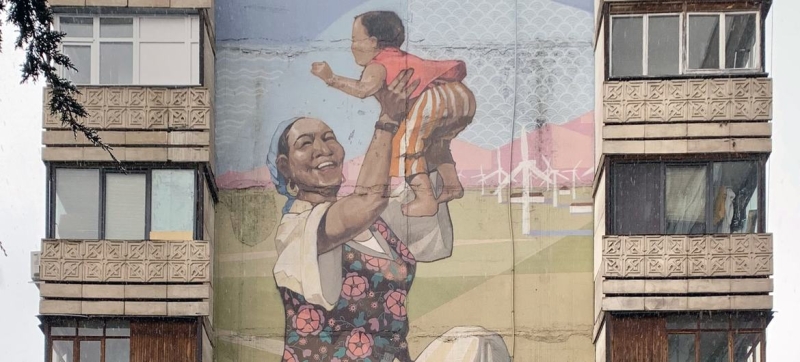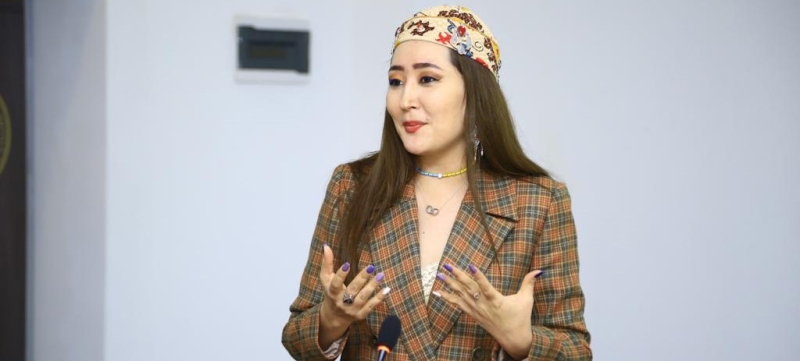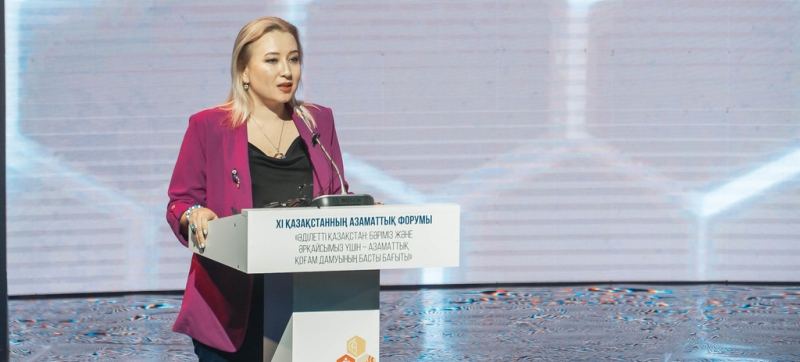
Street mural in Almaty, dedicated to Kazakh women. Gender equality: a large-scale study by the UN and the government of Kazakhstan Women
Women in Kazakhstan have enough rights and opportunities – this is the opinion of 73 percent of the country’s male population. Among women, about 58 percent of participants in a large-scale sociological study on gender equality, which was recently conducted in Kazakhstan with the support of UN Women and the UN Development Program, share this opinion.
Between past and future
Although the majority of respondents speak out against violence against women, many do not realize that coercion of non-consensual sex, threats and intimidation of women by their husbands or partners, and control of the appearance, finances and communications of wives or partners are manifestations of gender violence. 18 percent of respondents fully or partially accept the use of physical violence by men against their wives or partners, and more than 60 percent of respondents said that men “have the right” to fully or partially control the appearance, communication and meetings of their wife or partner.
“Today in Kazakhstan there is a real battle of opinions between quasi-traditionalists and liberals,” said Aigerim Kusainkyzy, a representative of the younger generation of Kazakh women’s rights activists in the republic, Master of International Law, in an interview with the UN News Service. – The struggle of the old with the new vision of what a modern Kazakh woman should be. The first are confident that giving women even greater rights is a Western trend that contradicts Kazakh traditional values. They are sure that a woman should not work, let alone participate in politics. But the worst thing is that the so-called “traditionalists” believe that a husband may well raise his hand against his wife if she suddenly dares to object to him.”

Fighter for women’s rights in Kazakhstan Aigerim Kusainkyzy.
Aigerim believes that the recent brutal murder of a young woman, presumably by her husband, a former high-ranking official, became the trigger for that very struggle of ideologies in Kazakh society. The majority of citizens of the republic started talking about the need to criminalize domestic violence against women and children, since, according to current legislation, such facts relate only to administrative offenses, sometimes with a minimum or suspended sentence.
Last fall, parliament began considering amendments aimed at toughening penalties for domestic violence.
Criminalization of violence is a deterrent for tyrants
The high-profile murder of a young woman, in which her husband, a former high-ranking official, is suspected, has become a serious impetus for the Kazakh authorities to take such a step as toughening penalties for domestic violence. So says Khalida Azhigulova, doctor of law and UN international consultant on the prevention of sexual exploitation and abuse.
“The violent death of a young woman from a wealthy family radically changed the situation that existed in the legal field countries and finally there is political will to take preventive measures. Firstly, many people really became afraid for their daughters; it turned out that domestic violence does not exist somewhere far away, in families where alcohol is abused, and among socially vulnerable segments of the population,” Azhigulova said.
Secondly, in her opinion, the active position of journalists had an effect. “The authorities realized that this situation, using the example of this high-profile murder, causes serious damage to the image of the country and blurs all its achievements. Personally, I had to give comments to many publications to talk about the reasons for what happened,” the interlocutor added.

UN International Consultant on the Prevention of Sexual Exploitation and Abuse Khalida Azhigulova.
According to her, too humane laws and subsequent cosmetic amendments only led to the offenders realizing their impunity.
“According to UN statistics, which were published back in 2017, more than 400 women die every year in Kazakhstan at the hands of tyrants, while according to the official statistics, only 80. I I believe that the UN data better reflects the real state of affairs. And I can judge this based on the number of requests for help coming to our hotline from women. On average, this is 40-50 calls a day about facts of violence,” Dina Tansari, the founder of the non-governmental foundation “NeMolchiKZ”, told the UN News Service. Women’s mortality rates, she said, do not include cases of incitement to suicide.
At the end of last year, the President of Kazakhstan officially announced the need to criminalize domestic violence. The new bill, which included more than a hundred amendments, was approved in the Mazhilis and sent to the Senate. If approved, the new law will then go to the head of state for signature.

Founder of the non-governmental foundation “NeMolchiKZ” Dina Tansari.
Polygamy and the radicalization of Kazakh society
All three interlocutors of the UN News Service believe that the issue of women’s rights and the radicalization of modern Kazakh society are interconnected.
“I am very alarmed by the fact that the number of so-called “traditionalists” who zealously oppose the equality of women in the republic is growing year by year. Almost half of the country’s male population, under the banner of “the revival of national traditions and moral values,” advocates for the introduction of a “pre-colonial way of life” (i.e., pre-Soviet – author’s note), when wives looked after the children, looked after the man and his parents, and did not dare to think about work and were silent if they were beaten,” says Aigerim Kusainkyzy.
“Unfortunately, today we see how many public figures, primarily women themselves, including famous singers or models, openly declare that they will not mind if the husband brings a second wife into the house,” Aigerim emphasized.
Despite the fact that Kazakhstan is a secular state and polygamy is prohibited by law, sociologist and doctor of international law Khalida Azhigulova believes that the roots of this situation lie in the legislative reform that was carried out back in 1997, after five years from the moment the republic gained independence.
“Surprisingly, as part of the 1997 reform, many important articles on protecting women from violence and coercion and protecting women’s rights that were present in the Criminal Code of the Kazakh SSR in 1959 disappeared from the legislation. Thus, according to Article 107 in its current form, polygamy is not a criminal offense. Meanwhile, in neighboring Kyrgyzstan, Tajikistan and Uzbekistan, polygamists face a long prison term,” Azhigulova said.
Today we see how many public figures, primarily women themselves, including famous singers or models, openly declare that they will not against if the husband brings a second wife into the house
Aigerim Kusainkyzy believes that the struggle of old pre-colonial thinking with modern views and trends through discussions and dialogue will help Kazakh society ultimately accept and form new traditions that are adequate to the times.
“Everyone knows that the Great Silk Road ran through Kazakhstan and for many centuries people of many nationalities passed through our steppe. I believe that the Kazakh people, who have always been open to new things from the outside, will be able to preserve their original values, which correspond to universal values. But this takes time,” the activist believes.
Read also:
INTERVIEW | Women’s rights in Kazakhstan: progress has been made, but much remains to be done
UN in Kazakhstan
In March in Astana a presentation of the results of the analytical survey “Public perception of gender equality and women’s empowerment in Kazakhstan” took place, which was carried out with the support of the United Nations Development Program (UNDP) and UN Women together with the Ministry of Culture and Information of the republic. The document was based on data from a survey of 3,800 respondents from 17 regions of Kazakhstan and three cities of republican significance.
“An opinion poll of this nature was conducted in Kazakhstan for the first time. It provides a valuable source of up-to-date information on perceptions of gender equality and women’s empowerment in Kazakhstan, which can be used by national partners to develop and adopt effective policies,” UN Resident Coordinator in Kazakhstan Michaela Friberg-Story told UN News Service.
Kazakhstan has made progress in closing the gender gap, but there is still a long way to go, especially on equal pay and women’s representation in senior management, she said. Women are now a key driver of economic growth. In Kazakhstan, more than 43 percent of small and medium-sized businesses are led by women, making a significant contribution to GDP and employment.
In 2023, Kazakhstan rose to 62nd place out of 146 countries in the Global Gender Gap Index thanks to the efforts of the government, private sector and civil society. The UN has opened 17 Centers for the Development of Women’s Entrepreneurship. These centers have already helped thousands of women start and grow businesses using digital tools and e-commerce.
“We are already seeing legislative changes being made to protect women and children. We support programs aimed at protecting women’s rights. But we still have a lot to do,” concluded Michaela Friberg-Story.
